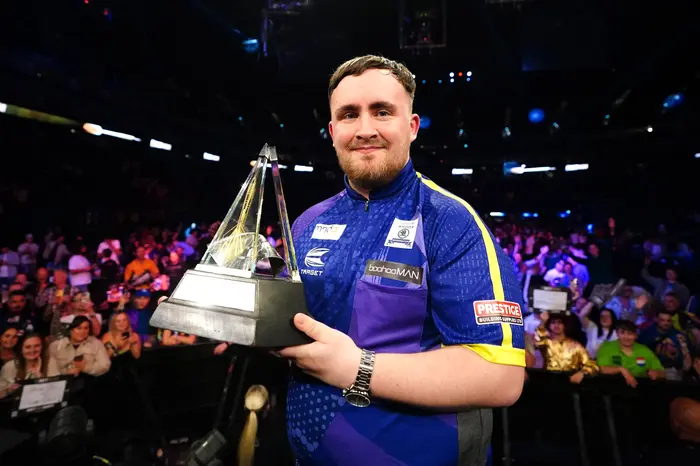
Young darts sensation Luke Littler has come under scrutiny after former darts legend Dennis Priestley criticized his recent decision to rent a high-end property in Warrington for a staggering £6,000 per month. Priestley described the decision as potentially Littler’s “biggest mistake yet,” suggesting that the 17-year-old would be better off investing in a mortgage rather than pouring his earnings into a rental property.
Littler, who has enjoyed a breakthrough year in darts, rose to prominence after reaching the World Darts Championship final in January and clinching the Premier League title in May. His rapid ascent has been marked by stellar performances, and he’s fast becoming a prominent figure in the sport. Despite his impressive earnings and accomplishments, his recent housing decision has sparked concern from Priestley, who argues that Littler should be focusing on securing his future by investing in a home he could own.
The young darts star’s choice to move into a luxurious five-bedroom mansion on the prestigious “Millionaires Row” in Warrington has raised eyebrows. The detached property is located on the outskirts of his hometown in Cheshire and boasts upscale amenities, including a large swimming pool, six bathrooms, and a sprawling garden. Images of the property show it as a lavish retreat, a significant upgrade from the more modest £180,000 two-bedroom semi-detached house where Littler’s family previously lived.
Since moving into the property, Littler’s parents, Anthony Buckley and Lisa Littler, have shared photos of themselves enjoying their new home, including taking a dip in the swimming pool. Their enthusiasm for the new residence is evident, but Priestley sees the arrangement differently. He believes that renting such an expensive property could be a financial misstep for the young star, especially given the amount Littler is shelling out monthly. According to Priestley, this substantial sum would be better invested in a mortgage, which would build equity and long-term security for Littler and his family.
In an interview with OLBG, Priestley elaborated on his perspective: “If he’s only renting, then it’s one of the biggest mistakes he’s made and that his advisors have allowed him to make. Why rent when you could be putting your money into bricks and mortar? Paying £6,000 a month for rent is a significant outlay, and it’s not going towards anything he can truly call his own.” Priestley expressed hope that someone in Littler’s camp has thoroughly assessed this decision, suggesting that perhaps the choice to rent was made for tax reasons. “I’m no accountant, but hopefully someone has advised Luke. Maybe he’s renting temporarily to boost his tax return—I’m not sure. But from what I’ve seen, renting doesn’t offer the same benefits as investing in a property would.”
Priestley’s comments reflect a common sentiment in financial planning: that young, high-earning athletes should focus on securing assets that build long-term wealth. However, there is one practical reason Littler may not yet be in a position to buy a home, even if he wanted to. Under UK law, Littler is currently unable to apply for a mortgage due to his age. At 17, he is still considered a minor in terms of legal contracts, including mortgages. He will need to wait until his 18th birthday on January 21 before he can even consider purchasing a home under his own name.
The housing choice has also attracted media attention beyond the darts community, with The Mirror recently reporting on Littler’s move to the extravagant property. The outlet revealed that the teenager had made the leap from the family’s former modest residence to this upscale rental, turning heads with his upgraded lifestyle. The publication shared images of the luxurious estate, highlighting the spacious and high-end features that make the property worthy of its “Millionaires Row” address.
Priestley’s remarks underline a broader concern for many athletes who find themselves suddenly wealthy at a young age. Financial decisions can have lasting implications, and choosing a rental over ownership may seem counterintuitive to those who advocate for building long-term assets. However, for Littler, who has recently seen a rapid increase in earnings and fame, the choice to move his family into a home that reflects his newfound success might have felt natural and rewarding. The move could also have been intended as a way to provide his family with immediate comfort and luxury, without the commitment of ownership.
Despite the criticism, Littler continues to focus on his career and is undoubtedly aware that such choices come under public scrutiny as his star rises. His recent accomplishments on the darts circuit have elevated him into the spotlight, and his followers eagerly anticipate what he will achieve next. For now, he may simply be biding his time until he can secure a mortgage or possibly make other investments that align with his growing financial acumen.
For Priestley, the advice comes from a place of concern for Littler’s future and reflects the wisdom of a veteran who has witnessed the careers of many young athletes. His words serve as a reminder of the potential pitfalls that sudden wealth and fame can bring. As Littler matures, he will have ample opportunity to weigh the guidance of seasoned professionals like Priestley and make choices that best support his long-term well-being.
As Littler approaches his 18th birthday and potential eligibility for a mortgage, the darts world will be watching closely to see how he manages his career, finances, and personal life in this new chapter. Whether he chooses to heed Priestley’s advice or continue charting his own path, there’s no doubt that Luke Littler’s journey—both on and off the darts stage—will be one to watch.
Leave a Reply